 Petzlover
Petzlover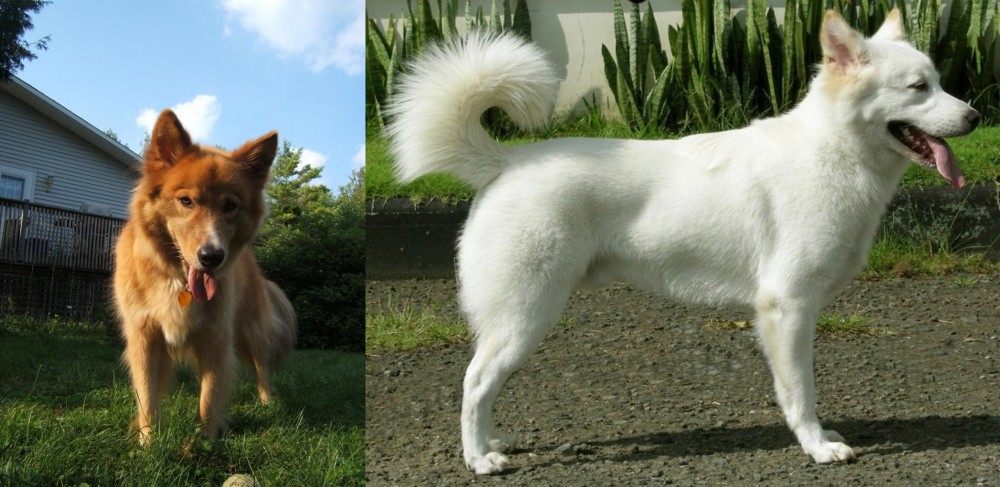 Karelo-Finnish Laika is originated from Russia but Kintamani is originated from Indonesia. Karelo-Finnish Laika may grow 7 cm / 2 inches shorter than Kintamani. Both Karelo-Finnish Laika and Kintamani are having almost same weight. Both Karelo-Finnish Laika and Kintamani has almost same life span. Both Karelo-Finnish Laika and Kintamani has same litter size. Both Karelo-Finnish Laika and Kintamani requires Low Maintenance.
Karelo-Finnish Laika is originated from Russia but Kintamani is originated from Indonesia. Karelo-Finnish Laika may grow 7 cm / 2 inches shorter than Kintamani. Both Karelo-Finnish Laika and Kintamani are having almost same weight. Both Karelo-Finnish Laika and Kintamani has almost same life span. Both Karelo-Finnish Laika and Kintamani has same litter size. Both Karelo-Finnish Laika and Kintamani requires Low Maintenance.
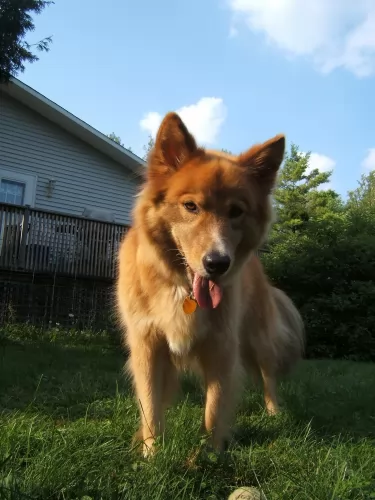 The Karelo Finnish Laika is a Spitz type hunting dog from the Karelia area of Russia.Some people say the dog developed in Sweden. The dog is from a group of ‘Laika’ breeds and has that typical Spitz-type look – the sharpish face, the erect ears and the tail which curls over the back.
The Karelo Finnish Laika is a Spitz type hunting dog from the Karelia area of Russia.Some people say the dog developed in Sweden. The dog is from a group of ‘Laika’ breeds and has that typical Spitz-type look – the sharpish face, the erect ears and the tail which curls over the back.
This attractive dog was developed as a hunting dog, and has a thick, weatherproof coat.The Karelo-Finnish Laika breed developed because people wanted a smaller sized hunting dog that could cope well with the weather, and these Laika dogs matched well.
The breed is ancient – centuries old, and after dying out in numbers during the second world war, the breed was revived when Russians imported Finnish Spitzes from Finland and bred them. The dog is similar to the Finnish Spitz, and in 2006 the Finnish Kennel Club and Russian Kennel Federation included the Karelo-Finnish Laika as a Finnish Spitz breed.
 The Kintamani dog is an ancient cross-breed and hails from Bali Island, Indonesia.
The Kintamani dog is an ancient cross-breed and hails from Bali Island, Indonesia.
The beautiful dog is classified into the working dog group.
It isn't sure how the dog developed, and it is believed that local Balinese feral dogs might have had a show in with bring the breed about. There are many stories regarding the origination of this breed but in 2006 the dog got recognition in Bali under the category 'distinct' dog breed.
There are efforts to see the Kintamani dog get global recognition.
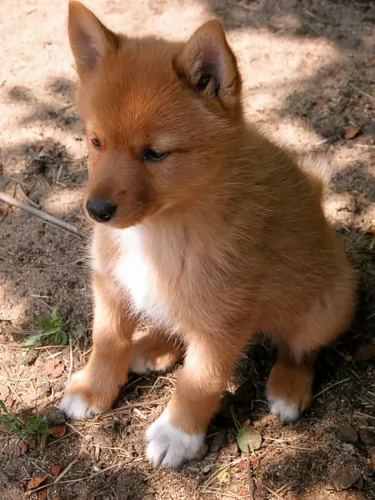 With his wolf-like appearance, the Karelo Finnish Laika is a sharp, intelligent dog and is the smallest Laika in Russia used for hunting. He stands at about 38–48 cm in height and weighs about 11 - 14 kg.
With his wolf-like appearance, the Karelo Finnish Laika is a sharp, intelligent dog and is the smallest Laika in Russia used for hunting. He stands at about 38–48 cm in height and weighs about 11 - 14 kg.
His coat is a reddish color and the fur is fairly long and coarse with a dense, soft undercoat. He looks like a red fox with his sharp, bright face, his erect ears, black nose and bushy tail which curls over the back.
The Karelo-Finnish Laika is a sweet dog with a quiet character. Whenever you suggest a game for him, he throws his docile side to the wind and becomes highly energetic and animated. He is an active dog and loves nothing more than a game with his human family members.
He is mistrustful of strangers, he tends to bark easily and he is territorial and all these characteristic go towards making him a good watchdog. He is quite prepared to live peacefully alongside other dogs in the home, more so when he has been trained and socialized.
He makes a great friend and pet for families and is more than ready to be loving and loyal to his human family.
 Looking quite a bit like the Malamute, Chow and Samoyed, the Kintamani is a medium sized dog and has a broad face, erect ears, dark-brown eyes and a thickly plumed tail that is essentially held high.
Looking quite a bit like the Malamute, Chow and Samoyed, the Kintamani is a medium sized dog and has a broad face, erect ears, dark-brown eyes and a thickly plumed tail that is essentially held high.
The Kintamani is a Spitz type dog with an attractive appearance. Standing at 40 to 55cm, the Kintamani weighs in at roughly 13 to 17kg. The colors of the medium to long haired coat are white, beige, black and even brindle, though less common.
Having an independent nature and being territorial, your Kintamani can become aggressive with other dogs. He is very loving and accepting of his human family members though, becoming very loyal to one favorite family member.
They're alert and curious and make good watchdogs. He is also fond of swimming and climbing so he makes a good sport companion.
He is an intelligent dog and he can be easy to train. He is strong-minded and an independent thinker, so training and socialization will rein him in a bit and make him obedient and amicable.
 The Kintamani dog is an alert, bright, intelligent dog who will make you a good watchdog.
The Kintamani dog is an alert, bright, intelligent dog who will make you a good watchdog.
He also makes a companionable pet, and is friendly, loving and loyal to his human family. He has a social, lively temperament, and as people see what awesome pets they make, they are becoming more in demand as they are also easily trainable.
Do your duty towards this attractive dog and love and care for him like any other family member and he’ll be your most devoted best friend.
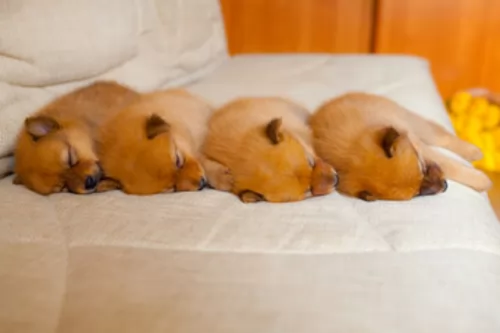 Apart from his good looks, the Karelo-Finnish Laika happens to be a pretty healthy breed and there are no known hereditary health problems with him. Diseases which can affect any dog -
Apart from his good looks, the Karelo-Finnish Laika happens to be a pretty healthy breed and there are no known hereditary health problems with him. Diseases which can affect any dog -
Many large breeds are prone to hip dysplasia. In hip dysplasia, joint problems cause arthritis and pain and eventually lameness. These days, when buying a puppy, people ask breeders about whether the parents were screened for hip dysplasia.
Any dog fed the wrong diet and who isn’t exercised can become overweight. Obesity in dogs is linked to many health problems in dogs. If you’re in doubt about your pet, consult with your vet on the best food for him.
Many dogs are at risk for certain types of cancer, including lymphoma which is cancer of the lymph nodes. When you are brushing your pet, check him for any unusual lumps so that you can catch cancer early.
Dilated cardiomyopathy (DCM) is where the chambers of the heart are stretched out and don't pump blood properly. Sometimes it can go undetected for a while until the dog becomes seriously ill, requiring emergency medical attention. Medications can regulate heart rhythm but there is no cure.
 You’re the only one who knows your dog, so you’re the one who will pick up signs that he isn’t well.
You’re the only one who knows your dog, so you’re the one who will pick up signs that he isn’t well.
You can tell a lot from your dog’s behavior, and often a dog that isn’t well will hide away in a corner. If you're worried about your pet’s health, get him to the vet for peace of mind.
Being a responsible dog owner requires you regularly performing body checks on your pet.
The canine parvovirus (CPV) infection is a very contagious viral illness that affects dogs. The intestinal form will have your dog vomiting, he won’t want to eat and he’ll have diarrhea.
The other less common type is the cardiac parvo where the heart muscle of a fetus is attacked, leading in all likelihood to death. Thankfully the incidence of the parvo-virus infection has been reduced by vaccination of puppies.
This is a tick-borne illness that is transmitted through deer ticks. It is a disease more typically seen in dogs from the northeast United States. Common signs of the illness are lameness, lethargy and enlarged lymph nodes. Most dogs respond well to antibiotic treatment.
Take a look inside your dog’s ears and check for itchiness, discharge and redness. Inside the dog’s ears it is very sensitive so if you don’t want to clean his ears, rather leave you vet to do it as you don’t want to perforate your dog’s eardrums.
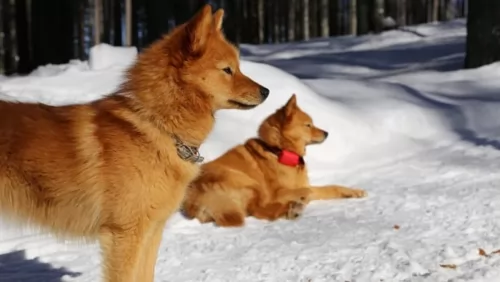 The Karelo-Finnish Laika is a most attractive looking dog and his thick, double coat will need to be brushed at least twice a week to keep it free from dust, grass and burrs. He sheds throughout the year so this brushing will keep the loose dog hair under control.
The Karelo-Finnish Laika is a most attractive looking dog and his thick, double coat will need to be brushed at least twice a week to keep it free from dust, grass and burrs. He sheds throughout the year so this brushing will keep the loose dog hair under control.
Watch your Karelo-Finnish Laika’s diet as a lean, mean dog can live longer than one who is overfed. Dogs which are overweight are likely to develop joint problems and heart disease.
The quality of food you feed your pet is hugely important. Popping chocolates and peanuts into his mouth because you love him so much will be toxic for him. Apart from his top quality dry kibble, add in some cooked chicken, rice and vegetables as a tasty treat and mix in a little bit of raw meat also when you can.
Exercise for your Karelo Finnish Laika is a key component to prolonging his life, and he absolutely loves games, walks and action all the way. It will keep him in shape, keep him happy and prolong his life.
 The thick, lustrous coat of the Kintamani will need to be brushed twice a week because the coat is capable of getting burrs in. He sheds, so to keep the coat lustrous you want to be brushing him twice a week to remove all those loose hairs.
The thick, lustrous coat of the Kintamani will need to be brushed twice a week because the coat is capable of getting burrs in. He sheds, so to keep the coat lustrous you want to be brushing him twice a week to remove all those loose hairs.
The dog can adjust to life in the city or the countryside, but being energetic it is best that they have a reasonable sized garden or life on a farm. He will be quite happy with some good walks, but he'll want some more rough and tumble. He just loves joining you on a hike and climbing on rocks. These dogs are actually known for their climbing skills.
Kibble isn’t all equal, and dog owners have a huge choice, with the idea being to find the most nutritious one. Good food is key to good health for your Kintamani.
Your Kintamani puppy will require 4 meals a day. As he reaches adulthood you can start feeding him one or two meals a day.
The Kintamani has a beautiful thick coat and you want to ensure it stays that way by feeding him the best quality food there is. Top-quality dry food from a reputable brand will ensure balanced nutrition.
Read the packaging to ensure you’re giving him food that is appropriate to his age and for medium sized dogs. He will do well on some cooked chicken, brown rice, pasta and vegetables being added to this dry kibble every now and again as a treat.
If you’re unsure about whether he is getting the right kind of food in with a good balance of vitamins and minerals, you can always speak to your vet. Make sure that fresh, cool water is constantly available to him and wash his food and drink bowls regularly.